Daniel Kötter
DirectorWriter
-
Birthday
-
Zodiac Sign
-
Genres
0
Total Films
Also known as (male)
Place of Birth
-
Birthday
-
Zodiac Sign
-
Genres
0
Total Films
-
Also Known As (male)
-
Place of Birth
-
Birthday
-
Zodiac Sign
-
Genres
0
Total Films
Also known as (male)
Place of Birth
-
Birthday
-
Zodiac Sign
-
Genres
0
Total Films
-
Also Known As (male)
-
Place of Birth
actor
0 Works
producer
0 Works
director
20 Works
writer
3 Works
other
6 Works
Roden
The woods, the forest, the plantation. Wood, charcoal, palm oil. Where trees are cleared, the way people meet, farm and live together changes, locally and universally. Together with the Congolese women's rights activist Olande Byamungu, the Indonesian instrument maker and musician Ikbal Lubys and the German carpenter and performer Wolfram Sander, the documentary filmmaker and theatre director Daniel Kötter is developing a film parcours and theatre forest in Roden / Kukata Mi/ / Pembalakan, taking the audience to the Bergisches Land near Cologne, to the Indonesian palm oil plantations in Kalimantan and to the charcoal kilns in South Kivu, DR Congo.Year:
2025
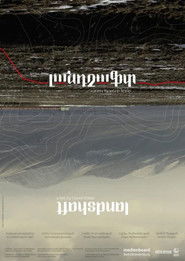
Landshaft
The conflict between Armenia and Azerbaijan over the control of Karabakh rumbles on stealthily. From Lake Sevan to the gold mine of Sotk—occupied by Azerbaijan since the 44-Day War of 2020—Daniel Kötter travels through a border valley surrounded by mountains, encountering the people who anxiously watch on as those in power tear each other apart at their expense.Year:
2023
Water & Coltan
This film contrasts two natural resources, two locations, and two layers in time. The common denominator is mining—and the traces it leaves behind in landscapes and communities. On the one hand, we have the depleted coal mines of Germany’s Ruhr region, where the long-term consequences of mining activity are emerging. On the other, we have the still-active mines in Democratic Republic of the Congo, where coltan—essential for the manufacture of smartphones and other devices—is being extracted from the earth.Year:
2021
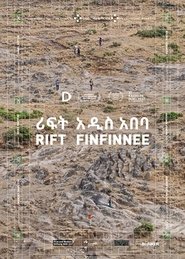
Rift Finfinnee
Socio-geographic explorations on the periphery of Addis Ababa, run through by a variety of borders and rifts – between agrarian and urban spatial practices, between economic and linguistic floes, between perspective and dilemma. A polyphonic audiovisual narrative of people who are forced to experience the impetuous urbanisation of African societies the hard way, recorded as a case study that expands into a complex allegory.Year:
2020

Rift Finfinnee
Socio-geographic explorations on the periphery of Addis Ababa, run through by a variety of borders and rifts – between agrarian and urban spatial practices, between economic and linguistic floes, between perspective and dilemma. A polyphonic audiovisual narrative of people who are forced to experience the impetuous urbanisation of African societies the hard way, recorded as a case study that expands into a complex allegory.Year:
2020

Rift Finfinnee
Socio-geographic explorations on the periphery of Addis Ababa, run through by a variety of borders and rifts – between agrarian and urban spatial practices, between economic and linguistic floes, between perspective and dilemma. A polyphonic audiovisual narrative of people who are forced to experience the impetuous urbanisation of African societies the hard way, recorded as a case study that expands into a complex allegory.Year:
2020

Rift Finfinnee
Socio-geographic explorations on the periphery of Addis Ababa, run through by a variety of borders and rifts – between agrarian and urban spatial practices, between economic and linguistic floes, between perspective and dilemma. A polyphonic audiovisual narrative of people who are forced to experience the impetuous urbanisation of African societies the hard way, recorded as a case study that expands into a complex allegory.Year:
2020
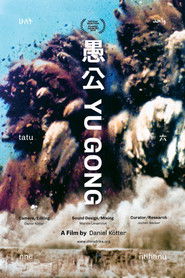
Yu Gong
A journey through the complex web of African-Chinese relations. The economic, political and cultural future of globalisation is taking shape. The dominant force behind these processes is no longer Europe.Year:
2019

Yu Gong
A journey through the complex web of African-Chinese relations. The economic, political and cultural future of globalisation is taking shape. The dominant force behind these processes is no longer Europe.Year:
2019

Yu Gong
A journey through the complex web of African-Chinese relations. The economic, political and cultural future of globalisation is taking shape. The dominant force behind these processes is no longer Europe.Year:
2019

Yu Gong
A journey through the complex web of African-Chinese relations. The economic, political and cultural future of globalisation is taking shape. The dominant force behind these processes is no longer Europe.Year:
2019
Desert View
The film Desert View is dedicated to the study of building and living in the semi - built satellite city Madinaty, located in the desert east of Cairo. The movie was made during a four-week residency experiment, to which the filmmakers had invited the three-generation Barakat family from ashweyat (informal residential district) Bashtil as a sort of cinematic diary. The temporary residents of Madinaty, filmmaker and Barakat family, captured their observations and experiences of architecture and their use from their respective perspectives and cameras. Two external perspectives on the desert dreams of the Egyptian middle and upper classes.Year:
2017
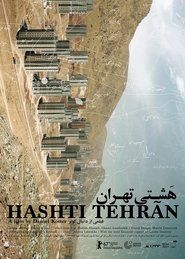
Hashti Tehran
Documentary on the outskirts of Tehran (Nord, East, South, and West) and the relations of people with space.Year:
2016

Hashti Tehran
Documentary on the outskirts of Tehran (Nord, East, South, and West) and the relations of people with space.Year:
2016

Hashti Tehran
Documentary on the outskirts of Tehran (Nord, East, South, and West) and the relations of people with space.Year:
2016

Hashti Tehran
Documentary on the outskirts of Tehran (Nord, East, South, and West) and the relations of people with space.Year:
2016
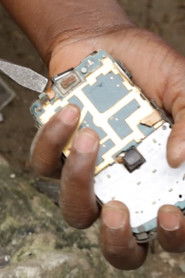
Chinafrika. mobile
The documentary film Chinafrika.mobile is tracking the life cycle of a mobile phone. From its birth in the mines in the Kolwezi, DR Congo, to its manufacturing in Chinese factories in the Pearl River Delta to its use and death in the markets and recycling dumps in Lagos, Nigeria, the mobile phone camera sends images of its global journey to the viewer's mobile phone display.Year:
-

state-theatre #3 BERLIN
The Staatsoper Unter den Linden, built in 1741, is the oldest theatre building in Berlin. In the course of its history it represented the most opposing political systems, from the Kaiser Reich to National Socialism and the Socialism of the GDR period. Its architectural layout was changed and reconstructed several times. From September 2010 the Opera House has again become a construction site for four years. After year-long controversial debates the state representatives assigned the architects to preserve the building's neo-rococo layout. The workers have left the factory and enter the stage. It could be that the work on the film is not yet completed at the end of the opera.Year:
-
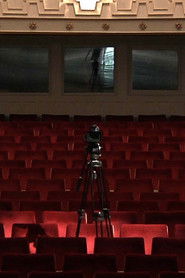
state-theatre #2 TEHRAN
The Tehran Vahdat Hall was Iran's first and only classical opera and ballet house. Commissioned in 1966 by the Shah's regime, the main hall resembles Vienna State Opera. Its ornaments reiterate the forms of Persepolis, the central representative architecture of the ancient persian Empire. For 13 years the hall hosted the classical ballet and opera repertoire though the official archive of Vahdat Hall does not keep any records of that period.Year:
-

state-theatre #1 LAGOS
The National Theatre of Nigeria in Lagos was built for the second World Black and African Festival of Arts and Culture (FESTAC) in 1976. It is the only state-subsidized theatre in Nigeria. While its smaller halls are occasionally used for theatre performances, banquets and weddings, the 5000-seat main hall has been deserted since the early 1990s. A reopening was scheduled for 2010 but postponed indefinitely after a series of changes in direction. counter shot: The Bariga Arts Center was founded in 2009 in a Lagosian slum by choreographer and Nollywood actor Segun Adefila, after the rent free agreement between his company Crown Troupe of Africa and the National Theatre of Nigeria had been revoked.Year:
-